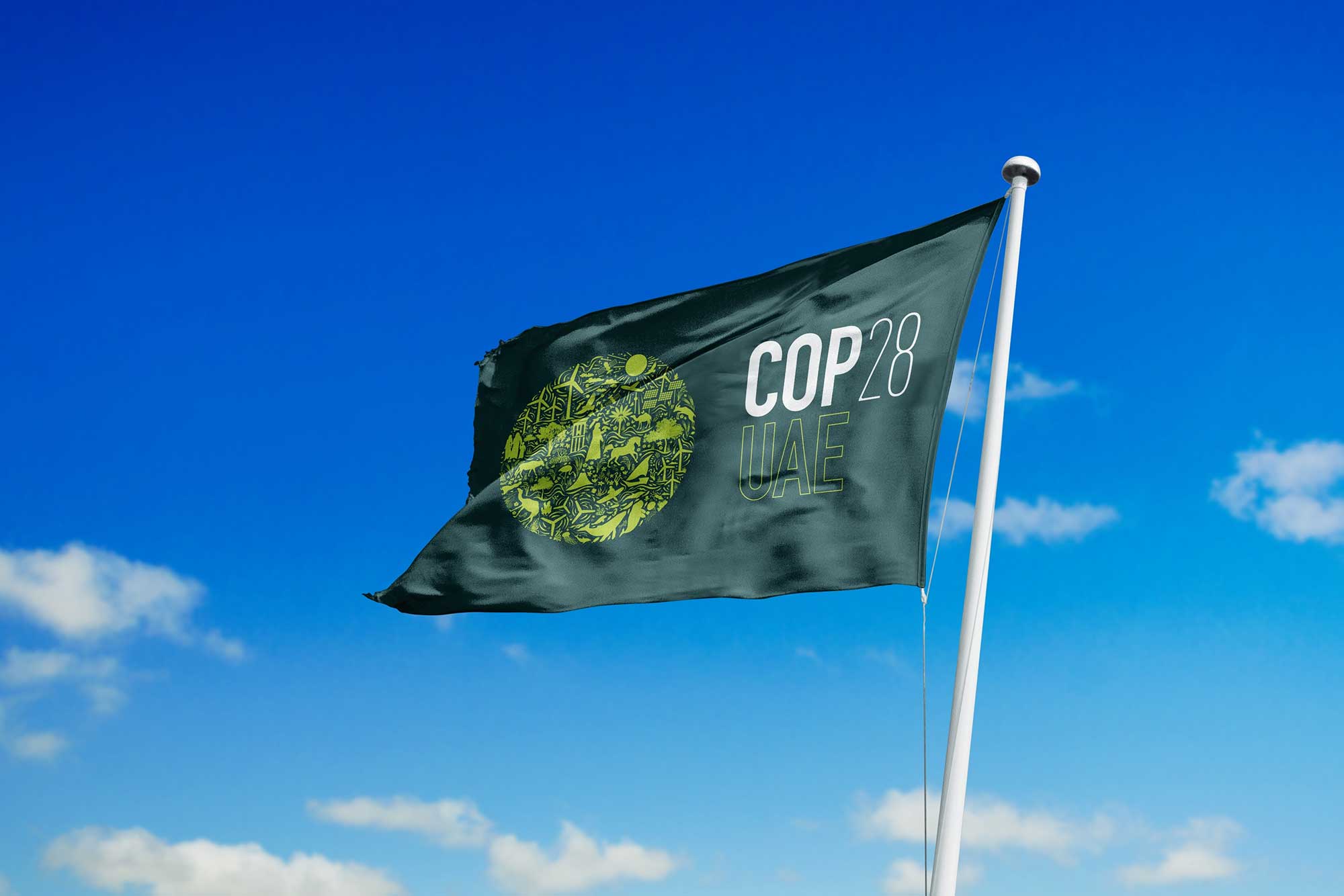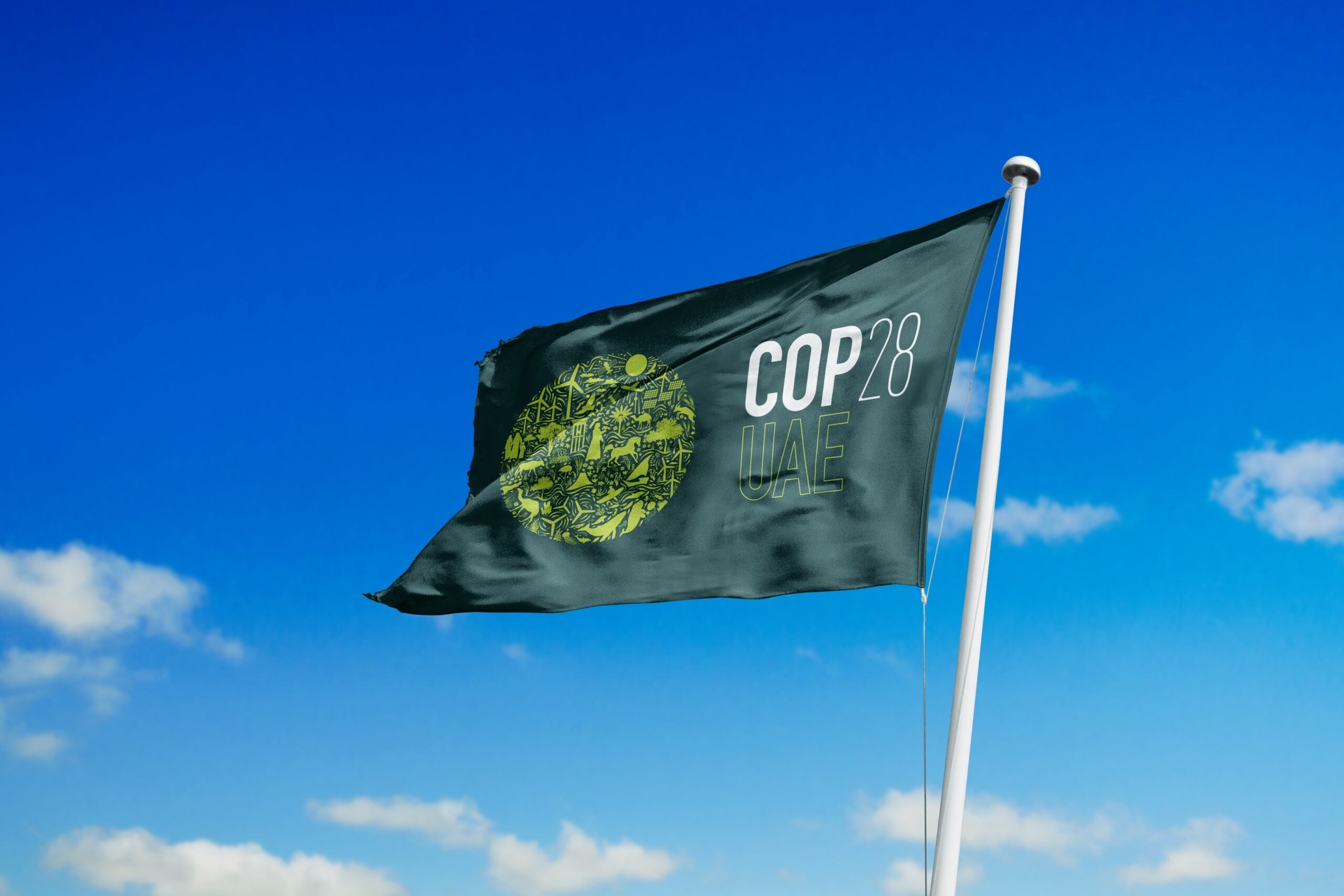Hey team, and welcome back to one5c. Today marks the official start of COP28, the annual U.N. climate summit, in all its hope and bluster. For the next two weeks, delegates from 194 nations will convene in Dubai to assess global progress in addressing the climate emergency. It’s…quite something: Around 70,000 people are descending on the United Arab Emirates for the main event—and all the side meetings and parties. Leonardo DiCaprio is going.
The choice of venue is also more-than-quite-something. This year, the leader of the summit is Sultan al-Jaber, the CEO of the UAE’s largest oil company. If you have concerns about his ability to keep his gassy interests out of things, you’d be right.
All this is enough to make ya wonder if COP, now in its 28th year, still matters. It does, but perhaps not in the way you’d think. —Corinne
WHY YOU SHOULD CARE ABOUT COP
By Corinne Iozzio

The venue for COP28 raises flags, but the summit still matters. rafapress/Shutterstock
What do 70,000 suits sitting at negotiating tables on the other side of the globe have to do with your day-to-day? The decisions made at COPs eventually and inevitably trickle down, from the surging availability of electric vehicles to the renewable energy projects funneling electrons to our iPhones. People living in the developing world feel the impacts of action (or inaction) even more immediately. But, in addition to things happening down the line, these massive international meetups also provide a guidebook for how climate-active individuals can press their elected officials and community leaders for change—right now.
What is COP?
We’ll start with the basics. COP, which literally means “conference of the parties,” is an annual conference organized by the United Nations. It’s been around since 1995, when the inaugural event was held in Berlin. It’s a BFD because it’s the only summit of its kind and has a singular focus of bringing together global leaders to set the agenda on addressing and mitigating the climate crisis.
Is it working?
Fair question. The steady stream of bad—even dismal—report cards leading up to this year’s conference have raised alarm bells about the efficacy of the sessions 28 years in. But it’s important to know that COPs have pointed things in the right direction. In 2001, the world was on track to hit 5.8 degrees of warming by 2100, and mitigation efforts have shallowed that trajectory as low as 2.4 degrees. That’s not where we want to be, but it’s better than if we’d done nothing.
COP28, in particular, is an important moment in measuring what’s gotten done and what still needs doing, because it will include negotiations around something called the “global stocktake.” Each attending nation reports on its progress toward achieving the goals enshrined in the Paris Agreement in 2015 (that’s COP21), specifically making the changes needed to keep the global temperature increase below 2 degrees Celsius—or preferably 1.5. It’s the ambassadorial equivalent of going around the room and saying “Here’s what I did to unwind this catastrophe last summer.”
What’s happening at COP28
The U.N. released the technical findings of the stocktake in September. Its assessment—or “synthesis report”—found that the world is on track for 2.4–2.6 degrees of warming by the end of the century. Again, an improvement (we were barreling toward 3.7–4.8 in 2010), but not enough. The report calls for greater urgency on making systemic changes to slash emissions. Unsurprisingly, that means a swift phaseout of fossil fuels and a rapid scaling of renewable energy, among other things.
COP28 is about taking those findings and agreeing on what comes next. This is the meat of the matter. Delegates will negotiate about their nations’ emissions reduction commitments, investments in renewables, and financing for mitigation and adaptation work in the developing world.
What that means for you
Once all the COP agreements are settled, everyone goes home and gets to work. Or, that’s what’s supposed to happen. Because, as the stocktake report shows, nations—often the largest emitters—don’t get their homework done. “There are so many pledges and so many commitments, but things are often missing,” says Mahak Agrawal, a climate science and sustainability expert participating in COP28 sessions with UNESCO and Climate Clock. The biggest missing piece, she says, is “a road map to bridge the gap between commitment and action.”
This is where everyone not at COP28 playing Climate Celebrity Bingo comes in. We’re not saying it’s up to individuals to draw that road map, but COP is a moment where climate is on the world stage and an opportunity to put pressure on our political leaders to have some effin’ follow-through. “It’s about people seeing those commitments and figuring out what they can do to hold people accountable,” Agrawal says.
👉 Read about local leaders who are saving the world 👈
The outcomes and agreements from COP28 aren’t a list of to-dos for individual action. They’re a guidebook on what we need to be holding our leaders accountable for. Going into this year’s conference, analysts are hoping for movement on a range of issues, including a fossil-fuel phaseout (duh), greater commitments to paying climate reparations to developing nations, shifts toward a more sustainable food system, and more. Accountability—through voting, advocacy, and other means—is one of the strongest levers any individual has in taking action to save the planet
The roundup
In the news this week
- Virgin Atlantic completed its first transatlantic flight using sustainable fuel. The journey from London to New York City was powered by a blend made mostly from cooking oil and waste animal fat. The plane had no passengers or cargo, but it marks an important step (if only symbolic) in the decarbonization of air travel.
- The United Nations Food & Agriculture Organization has a message for the world’s richest nations: Eat less meat. (If you’ve been pondering this kind of change, check out Cool Beans, our delicious sibling newsletter.) The org’s report lays out a framework for developed nations to dial down their intake, while allowing for an uptick in developing countries, where livestock can help address malnutrition. Big Meat lobbyists will be pushing back against this at COP28.
- More than 10 million pounds of apples bound for the landfill or other waste disposal have been rescued and delivered to charities focused on alleviating hunger. The USDA funded the purchase and delivery of the fruit to nonprofits like The Farmlink Project.
- 175 countries have been working on a treaty to eliminate plastic pollution by 2040. With hundreds of millions of tons of the stuff entering the waste stream every year, the problem may seem intractable, but maybe it’s not? This op-ed in The Washington Post lays out how that goal might be possible.
- A new AI-powered permitting process promises to speed up the pace of new solar installations in California. The software, currently available in 22 cities, helps local governments comply with a state law requiring “instant permitting” for residential and battery buildouts.

